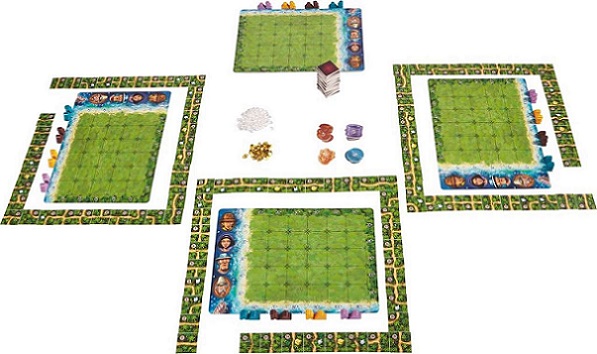Race Through the Jungle to Find Ancient Temples in Karuba

Players lay down tiles to make a path through the jungle, or discard them to move their adventurers. Who will be the first to reach the four lost temples?
A Spiel des Jahres nominee in 2016, it’s not surprising that Karuba is a well-designed, enjoyable game. But how exactly does it play?
Gameplay
Each player takes a player board which contains a grid of five by six spaces. Each player also takes one adventurer meeple and one temple of each of the four colors. The adventurers are placed along two sides of the grid while the temples are placed on the other two sides. Players take turns choosing where to place the different colors, but make sure that the final layout of all the player boards is identical (so that the purple adventurers are on the same space of the grid on all the boards, the brown temples are the same space on all the boards, and so forth). Each player then takes an identical stack of tiles numbered one through thirty-six. One player is chosen to be the expedition leader. He shuffles his tiles and places them face down in a stack. The other players lay their tiles faceup next to their game boards.
Every round of the game, the expedition leader draws the top tile from his stack and announces the number and the other players find their matching tiles. Every player (including the expedition leader) then chooses whether to add the tile to their grid or discard it. When adding a tile, you must make sure the number remains in the upper left hand corner. You do not need to place the tile adjacent to another piece. Tiles show paths, and while you can place a tile so that it creates a dead end, you must remember that your adventurers will be attempting to use these paths to reach the temples that match their colors. Some tiles also show a silver or gold gem. These are worth one to two points at the end of the game. When you place a tile with one of these gems, you place a matching gem on top of it. If one of your meeples ends its turn on this tile, you get to collect the gem.
When you discard a tile, you may move a meeple along any legal path it is on. The meeple may move one tile per movement point. You get two to four movement points based on how many path exits were on the tile you discarded. You may only move one meeple per round and you do not have to use the full movement.
The game ends once the last tile has been used or if one player gets all four meeples to their respective temples. You then score points for how many temples you reached and how many players reached that same colored temple before you, and on your gems. The player with the most points wins the game.

Review
Karuba is a fun, clever game that keeps the rules light and the scoring simple, and yet still presents players with an intriguing puzzle as they attempt to figure out the best layout for they tiles and how to pull ahead of their opponents.
There’s a lot in the game to ensure variety and that the puzzle will be a little different each playthrough. The meeples and temples have multiple possible start locations, and the order the tiles are drawn can make a significant difference. There is also plenty of information on the table, as you can see from the face-up tiles what has yet to be drawn, but you might not get a chance to play them all, if another player manages to reach all four temples first.
Choosing when to discard tiles and when to place them is important. You want to keep the meeples in prime positions, but you also need to have paths on which to move them. This gives players several different factors to consider and means that while players will start out with identical boards, the state of them will rapidly diverge.
On the downside, Karuba has very little (if any) player interaction. You are trying to figure out how to solve the puzzle slightly better than your opponents, and there is a race to reach each temple first, but you are mostly focused on your own board. The setup is a little tedious as well, as players sort through their tiles and lay them out in numbered order before the game starts. This does ensure, though, that turns are fast once you get going.
If you enjoy puzzles and tile-laying, Karuba is a satisfying combination of the two. Engaging, balanced, and accessible, the game has little downtime, and can be enjoyed by families as well as adult only groups.
Pros: Variation between games, fun blend of puzzle and tile laying, simple rules and scoring system, balanced play
Cons: Minimal player interaction, setup is a bit tedious
Disclosure: we received a complimentary review copy of this game.







